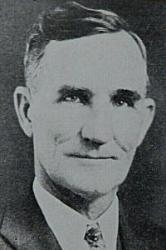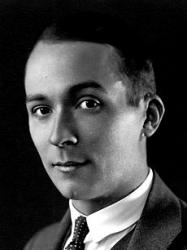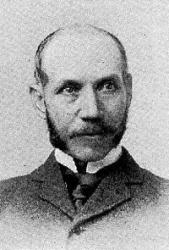Planning worship?
Check out our sister site, ZeteoSearch.org,
for 20+ additional resources related to your search.
- |
User Links
Person Results
William Lloyd
1786 - 1852 Composer of "MEIRIONYDD" in Trinity Hymnal (Rev. ed.) William Lloyd, a Welsh musician and music teacher, born at Rhos-goch , Llaniestyn , Llŷn , in 1786; died, according to his tombstone in Llaniestyn churchyard, on 7 June 1852 , aged 66. He is most known for his tune MEIRIONYDD. It was published under the name "BERTH" in Caniadaeth Seion ( 1840 ) published by Richard Mills.
Dianne Shapiro, from Dictionary of Welsh Biography, accessed 11-8-2018 from http://wbo.llgc.org.uk
William Lloyd
B. B. Edmiaston

1881 - 1955 Author of "Let thy mercies come to me" Benard Bates Edmiaston Born: July 16, 1881, Bennetts, Baxter County, Arkansas. Died: December 2, 1964, Bronte, Texas. Buried: Fairview Cemetery, Bronte, Texas. Bernard was the son of David W. Edmiaston and Georgia Ann Fluty, and husband of Ella Allen. He studied music under Rufus Turner, Franklin Eiland, W. H. Lawson, Berry McGee, Emmett Dean, G. W. Fields, John Herbert, and many others, and taught singing schools for at least 38 years. He wrote and published songs through the Trio Music Company, Waco, Texas, and was director of the Southern Development Normal School of Music in Waco.
© The Cyber Hymnal™ (www.hymntime.com/tch)
B. B. Edmiaston
Grant Colfax Tullar

1869 - 1950 Person Name: Grant C. Tullar Composer of "[Oh, how precious is the Savior]" in Sermons in Song Grant Colfax Tullar was born August 5, 1869, in Bolton, Connecticut. He was named after the American President Ulysses S. Grant and Vice President Schuyler Colfax. After the American Civil War, his father was disabled and unable to work, having been wounded in the Battle of Antietam. Tullar's mother died when he was just two years old so Grant had no settled home life until he became an adult. Yet from a life of sorrow and hardship he went on to bring joy to millions of Americans with his songs and poetry.
As a child, he received virtually no education or religious training. He worked in a woolen mill and as a shoe clerk. The last Methodist camp meeting in Bolton was in 1847. Tullar became a Methodist at age 19 at a camp meeting near Waterbury in 1888.
He then attended the Hackettstown Academy in New Jersey. He became an ordained Methodist minister and pastored for a short time in Dover, Delaware. For 10 years he was the song leader for evangelist Major George A. Hilton. Even so, in 1893 he also helped found the well-known Tullar-Meredith Publishing Company in New York, which produced church and Sunday school music. Tullar composed many popular hymns and hymnals.
His works include: Sunday School Hymns No. 1 (Chicago, Illinois: Tullar Meredith Co., 1903) and The Bible School Hymnal (New York: Tullar Meredith Co., 1907). One of Grant Tullar's most quoted poems is "The Weaver":
My Life is but a weaving
Between my Lord and me;
I cannot choose the colors
He worketh steadily.
Oft times He weaveth sorrow
And I, in foolish pride,
Forget He sees the upper,
And I the under side.
Not til the loom is silent
And the shuttles cease to fly,
Shall God unroll the canvas
And explain the reason why.
The dark threads are as needful
In the Weaver's skillful hand,
As the threads of gold and silver
In the pattern He has planned.
He knows, He loves, He cares,
Nothing this truth can dim.
He gives His very best to those
Who chose to walk with Him.
Grant Tullar
--http://www.boltoncthistory.org/granttullar.html, from Bolton Community News, August 2006.
Grant Colfax Tullar
James H. Burke
1858 - 1901 Person Name: J. H. Burke Composer of "[O Savior, precious Savior]" in Service Songs for Young People's Societies, Sunday Schools and Church Prayer Meetings James H Burke, 1855-1901, Born in Ireland, he emigrated to the U.S. in 1873. In Chicago, he attended the Moody Church and became a member. He taught Sunday school and started singing groups at the YMCA. He engaged in evangelistic work with D. L. Moody, Daniel Whittle, and others, going to Scotland and Britain for crusade work there for a year and a half. He was also music minister at the New York Gospel Tacernacle for a year in 1891. He traveled with Scottish evangelist, John McNeill for or year or so as well.
John Perry
James H. Burke
Charles Hutchinson Gabriel, Jr.

1892 - 1934 Person Name: Chas. H. Gabriel, Jr. Composer of "[Visit us, O precious Savior]" in Awakening Songs for the Church, Sunday School and Evangelistic Services Born: March 2, 1892, San Francisco, California.
Pseudonym: Jean Howard.
Gabriel was living with his parents in Cook County, Illinois, in 1910. He was still there in 1920 with his wife Ethel. In 1926, he was musical director and announcer for radio station KLX in Oakland, California. By 1930, he and his wife were in Los Angeles County, California.
The January 30, 1926 issue of Colliers magazine said of him:
"Gabe" has experienced all those changes which the Fates deem necessary to broaden one’s views. He has taught music in the Indianapolis [Indiana] and Northwestern Conservatories; edited mechanical and automobile magazines; traveled with Billy Sunday; been a newspaper reporter; rewrite man; music editor and book reviewer. In his spare time he has managed to produce eight hundred compositions which have been printed. He first became interested in radio when he was appointed director of WGN in Chicago [Illinois].
--www.hymntime.com/tch/
Charles Hutchinson Gabriel, Jr.
J. H. Rosecrans
1845 - 1926 Composer of "[O precious Saviour, I would lay]" in Gospel Praise Book. James Holmes Rosecrans studied at the Baxter University of Music in Friendship, New York. After teaching for two years, he joined the Fillmore Brothers Music House in Cincinnati, Ohio. As of 1880, he was teaching music in Douglas County, Colorado. In 1884, was an evangelist in California, and later was associated with evangelistic efforts in Texas, and taught music and Bible at Carlton College in Bonham, Texas. He published over 20 music collections in his lifetime.
© The Cyber Hymnal™ (www.hymntime.com/tch)
J. H. Rosecrans
M. Lowrie Hofford
1825 - 1888 Person Name: Rev. M. L. Hofford Author of "Safe Where Jesus Leads" in Gospel Praise Book. Born: January 27, 1825, Doylestown, Pennsylvania.
Died: January 9, 1888, Trenton, New Jersey.
Hofford attended Lafayette and Princeton, where he graduated in 1849. He studied theology at the Princeton seminary for a year, and became principal of the Camden collegiate institute. While there, he organized a church at Beverly, New Jersey, being licensed by the Presbytery in Philadelphia in 1852. In 1855, he was ordained an evangelist in Burlington, New Jersey. In 1860, he began teaching at the Trenton Institute, and in 1863 took charge of a military institute at Allentown, Pennsylvania that was later incorporated as Muhlenberg College; he served there as a professor and later president. He taught and pastored at Camden and Beverly, New Jersey, and Doylestown, Pennsylvania (1868-78), then became pastor at Morrisville, Pennsylvania.
--www.hymntime.com/tch
M. Lowrie Hofford
George F. LeJeune

1841 - 1904 Person Name: G. F. Le Jeune Composer of "[O Saviour, precious Saviour]" in The Endeavor Hymnal George Fitz-Curwood Le Jeune, 1841-1904
Born: June 18, 1841, London, England.
Died: April 11, 1904, Staten Island, New York.
Buried: Moravian Cemetery, Staten Island, New York.
Le Jeune studied music under Joseph Barnby and George Macfarren in London. In 1863, he moved to Montréal, Canada, where he continued his studies with George Carter. He later moved to America, playing the organ in churches in Hartford, Connecticut, and Philadelphia, Pennsylvania. He became the organist at St. John’s Chapel of Trinity Parish, New York City, in 1876, and also directed the choir there.
Sources:
Hughes, p. 471
--www.hymntime.com/tch
George F. LeJeune
Richard Frederick Littledale
1833 - 1890 Author of "O Savior, Precious Savior" Richard Frederick Littledale (b. Dublin, 1833; d. London, 1890) entered Trinity College, Dublin, as a foundation scholar, graduated with a bachelors degree in classics, a Masters of Divinity in 1858, then a Bachelors and Doctorate in Civil Law at Oxford in 1862. From 1856 to 1857 he was the curate of St. Matthew in Thorpe Hamlet, Norfolk, and from 1857 to 1861 was the curate of St. Mary the Virgin, in Soho, London. For the remainder of his life he suffered from chronic illness and spent most of his time writing. He authored many books and pamphlets on Anglican liturgy, theology, and the church’s engagement with society, and completed his good friend John Mason Neale’s work on the psalms after Neale died in 1866.
Laura de Jong
================
Littledale, Richard Frederick, LL.D., D.C.L., son of John Richard Littledale, merchant, was born at Dublin on the 14th of Sept, 1833, and was educated at Bective House Seminary, and Trinity College, Dublin. His University course was distinguished. In 1852 he became a University Scholar; in 1854 he was first class in Classics and gold medallist; in 1856 he won the Berkeley gold medal (for Greek), and other honours. He graduated B.A., 1855, M.A., 1858, LL.D., 1862, and D.C.L. at Oxford, 1862. Taking Holy Orders in 1856, he was Curate of St. Matthew's, in Thorpe Hamlet, Norwich, from 1856 to 1857, and of St. Mary the Virgin, Soho, London, from 1857 to 1861. Through ill-health he retired from parochial work in 1861, and devoted himself to literature. Dr. Littledale's publications amount to about fifty in all, and embrace Theological, Historical, Liturgical, and Hymnological subjects chiefly. His prose works include:—
(1) Application of Colour to the Decoration of Churches, 1857; (2) Religious Communities of Women in the Early Church, 1862; (3) Catholic Ritual in the Church of England, 1861; (4) Continuation of Dr. Neale's Commentary on the Psalms, vols. ii., iii., iv., 1868-74; (5) Commentary on the Song of Songs, 1869; (6) The Petrine Claims, 1878-84; (7) Plain Reasons against joining the Church of Rome, 1880, &c.; (8) Short History of the Council of Trent; and several articles in the Encyclopaedia Britannica, 1882-88. His contributions to periodical literature have been also extensive and valuable.
Dr. Littledale's Liturgical, Devotional, and Hymnological works include:—
(1) Offices of the Holy Eastern Church, in the Original Greek, with translation into English, Notes, &c, 1863; (2) Carols for Christmas and Other Seasons, 1863; (3)The Priest's Prayer Book, with hymns, 1864, and with Brief Pontifical in 1870 and later editions; (4)The People's Hymnal, 1867 ; (5) The Children's Bread. A Communion Office for the Young, with hymns, 1868; (6) Primitive Liturgies and Translations, 1868-69; (7) Children at Calvary: being The Stations of the Cross in Metre for Singing, 1872; (8) the Christian Passover, 1873; (9) The Altar Manual, 1863-77. He was joint Editor of Nos. 3, 4, 8 and 9 with the Rev. J. E. Vaux; and of No. 6 with Dr. Neale.
In addition to a large number of hymns, original and translated, in the above works, Dr. Littledale has also directly contributed original and translated hymns to:—
(1) Lyra Eucharistica, 1863; (2) Lyra Messianica, 1864; (3) Lyra Mystica, 1865; (4) The Eucharistic Hymnal, 1877; (5) The Roman Breviary in English, by the Marquess of Bute, 1879; (6) The Altar Hymnal, 1884; (7) Supplement to Hymns Ancient & Modern, 1889; (8) to the Night Hours of the Church; (9) to the St. Margaret's Hymnal [East Grinstead], 1875; and (10) to the Church Times, The Guardian, &c, &c.
Dr. Littledale's Hymnological works in verse consist of translations of Danish, Swedish, Greek, Latin, Syriac, German, and Italian hymns, together with original Carols, Hymns, and Metrical Litanies. His original hymns remain to be noted. These include the following:—
i. In the Priest's Prayer Book, 1864 :—
1. Captain of Salvation. Christian Warfare.
2. Christ, on Whose Face the soldiers. Passiontide.
3. Christ, Who hast for sinners suffered. Passiontide.
4. God the Father, from on high. For the Sick.
5. Lord Jesu, by Thy passion. Passiontide.
6. Lord, Who in pain and weariness. Passiontide.
7. 0 Jesu, in Thy torture. Passiontide. In Meditations and Prayers on the Passion of Our Lord Jesus Christ, 1863.
8. 0 Lord, to Whom the spirits live. All Souls.
9. The clouds of sorrow rest upon mine eyes. For the Sorrowing.
ii. In the People's Hymnal, 1867:—
10. Christ, our song we lift to Thee. Blessed Virgin Mary.
11. Christ, our Sun, on us arose. Whitsuntide. In Carols for Christmas, &c, 3rd series, 1864.
12. Christ, the Lord, Whose mighty hand. Prayer for Peace.
13. Day is past and gone. Evening. In the Church Times, Feb. 17, 1866.
14. Eternal Shepherd, God most high. Vacancy of a See or Parish.
15. Eternal Wisdom, God most high. Common of Doctors.
16. God eternal, infinite. Septuagesima.
17. Hidden Saviour, great High Priest. Holy Communion.
18. I believe in God the Father. The Creed.
19. I worship Thee, Lord Jesu. Holy Communion. In the Church Times, May 10, 1865.
20. In Paradise reposing. Burial of a Child.
21. In songs of glad thanksgiving. General Thanksgiving.
22. Lord, Whose goodwill is ever sure. In time of Famine.
23. Now the sun is in the skies. Morning. In the Church Times, Jan. 27, 1866.
24. 0 God of mercy, God of love. For Rain.
25. 0 God, Who metest in Thine hand. For those at Sea.
26. 0 God, Whose Sole-Begotten left. Almsgiving.
27. 0 sing to the Lord, Whose bountiful hand. Thanksgiving for Rain.
28. Set upon Sion's wall. Ember Days.
29. The Cedar of Lebanon, Plant of renown. Christmas. First published in Sedding's Christmas Carols, 1863.
30. The fight is o'er, the crown is won. Burial of a Sister of Mercy.
31. The wintry time hath ended. Thanksgiving for Fair Weather.
32. We are marching through the desert. Processional.
33. When the day hath come at last. The Judgment.
In addition to these, a few of the more widely used of Dr. Littledale's original hymns, as "From hidden source arising," and others, are annotated under their respective first lines. In the People's Hymnal, 1867, Dr. Littledale adopted the following signatures:—
A. L. P., i.e., A London Priest.
B., i.e., An initial of a former address.
B. T., i.e., The initials of a former address.
D. L., i.e. Dr. Littledale.
F., i.e., Frederick.
F. R., i.e., Frederick Richard.
L., i.e., Littledale.
P. C. E., i.e., Priest of the Church of England.
P. P. Bk., i.e., Priest's Prayer Book.
Taken as a whole, Dr. Littledale's translations from the seven languages named above are characterised by general faithfulness to the originals, great simplicity of diction, good metre, smooth rhythm, and deep earnestness. His original compositions are usually on special subjects, for which, at th$ time they were written, there were few hymns, and are marked by the same excellent features of a good hymn as his translations. His main object throughout is to teach through Praise and Prayer.
--John Julian, Dictionary of Hymnology (1907)
======================
Littledale, Richard F., p. 679, ii. He died at Red Lion Square, London, Jan. 11, 1890.
--John Julian, Dictionary of Hymnology, Appendix, Part II (1907)
Richard Frederick Littledale
M. Lynwood Smith
1924 - 2007 Author of "We Believe" in Blessed Refuge Morris Lynwood Smith (1924-2007) was a preacher for Churches of Christ. He preached and held gospel meetings throughout Oklahoma, Alabama, and elsewhere. He helped initiate a special annual gathering of one-cup congregations on July 4 and New Year's Day that met in a different Oklahoma town each year. His interest in music led him to attend the Stamps Quartet School of Music in 1947. He sang with "The Zita Boys," a quartet composed of Johnny Elmore, Billy Smith, C. A. Smith, and himself. Smith wrote and published several songs, often writing a song for the annual meetings. In his lifetime, Smith published 16 songbooks of his and others' songs and hymns. He published over 700 songs and helped publish the songs of many other hymn and song writers.
- M. Lynn; Source: Elmore, Johnny. "M. Lynwood Smith: His Life and Work." In Smith, M. Lynwood. "Passing It On": A Book of Sermons. Ardmore, OK: Johnny Elmore, Pathway Books and Bibles.
M. Lynwood Smith


 My Starred Hymns
My Starred Hymns


